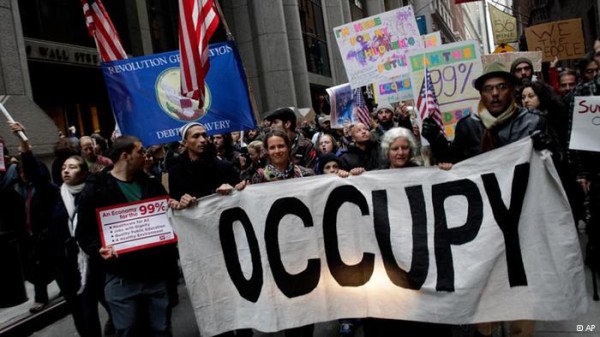The activist and author David Bollier tells Deutsche Welle why what he calls the Commons will change the way we live our lives and our system of politics.
DW: Can you define in a nutshell what you mean by the Commons?
David Bollier: The Commons is a system for managing shared resources or a system of governance when a community decides they want to manage a shared resource for the collective benefit outside of the market or the state. So they devise their own rules and systems for doing it. And there’s lots of Commons on the Internet, there’s lots of subsistence Commons and there’s lots of civic and social Commons. So it’s a different conceptualization how we can manage shared resources.
You argue that what you call the new Commons is a paradigm shift that will not only change our political, economic and cultural reality, but that it will create a new type of democratic polity. How so and why?
It’s an attempt to both respond to the palpable failures of the current liberal state which is so allied with the market and the market’s theory of what’s valuable – namely things that are bought and sold on the market which is a cause of many problems, especially environmentally. It’s also a response to the disenfranchisement that both the market and the state are doing to people and especially their local resources.
Many people organize Commons to take control and not as a matter of demanding rights which is the typical stance toward the state, but as a matter of demanding responsibility and stewardship and control themselves rather than for instance having absentee investors dictate to a community how their local resources, their water and land, will be used. Fundamentally, the Commons is about reasserting control among people who have a direct everyday stake in resources.
The form of Commons that probably most people will be familiar with is social collaboration over the Internet through what’s called creative commons licenses and projects like Wikipedia.
One of the reasons why the Internet is a place where there are so many Commons is because there are so few preexisting institutions and there are very low barriers to access, to creating your own Commons. You basically need a software platform and a community that shares certain values and goals. And so many what one might call little digital empires like Wikipedia, Linux, the operating system and literally countless smaller other ones have formed because it’s so easy for people to do that.
And what’s often not appreciated is that it’s a lightweight infrastructure that can outcompete the market which requires lawyers, advertising, talent recruitment, marketing and so on. That’s why see a lot of digital Commons outcooperate and outcompete conventional markets and why markets are having to go to legislators and say “give us legal privileges so that we can have a market in cyberspace.”
This form of the Commons certainly has an important impact on the Internet, but isn’t the bigger story on the Internet the rise of new corporate giants such as Google, Amazon, Apple, Facebook that may incorporate some form of collaboration, but their core is not shared values, but earning revenue?
You are right. But it’s a complicated story in that they provide a useful platform for people to share and collaborate which is Commons-like, but they of course own the platform and in the US we might call it digital sharecropping, where you are a tenet and they own the plantation. So that’s a serious issue.
However, there is also an implied social contract in which if they to aggressively push their monetization or appropriation of people’s personal data or how things operate, people are going to say “we go elsewhere.” And they often do. At the same time many people are trying to devise open access non-corporate platforms for the same activity. And you are seeing for example Openstreetmap is competing pretty well with Google Maps precisely because it doesn’t have the proprietary restrictions that Google Maps does. So long term some of those corporate giants may find that their proprietary franchise is being eroded by the Commons-based alternatives.
You cite Occupy Wall Street and the Arab Spring Movement which were powered by the Internet as examples of forms of Commons, but so are the Tea Party Movement and the climate change deniers. So isn’t it wrong and misleading to assume, just because it is done collectively over the Internet and can be called Commons, that it is per se a positive phenomenon when it is in fact neutral?
It is politically neutral in terms of the political ideological spectrum that you just sketched. But I do think it provides a more robust democratic participation than the nation state generally allows or invites. And furthermore it allows more direct control and user initiated rule making as opposed to legislator or governmental top-down initiated rule making. So there are qualitative differences of what type of governance and citizenship can occur. But you are right. It doesn’t map on to the ideological spectrum. The Commons isn’t just a retread of leftism and I think that is a virtue. I think it’s a virtue that all voices can be heard and the different permutations of cultural and political views can be brought together on the same platform.
Studies show that large numbers of Internet users don’t really interact with one another and if so then they do it via entities like Facebook that try to monetize those interactions. Isn’t the kind of meaningful interaction or innovation that you talk about really only driven by a very tiny slice of the population, perhaps what you could call the creative class or a small elite?
I think that’s a pretty anecdotal and conjectural approach. I haven’t seen those studies, so I won’t comment on that. The Tea Party is not necessarily an elite thing. The Pirate Party, I don’t know if that’s elite or not either. I think the point is that there is the opportunity for this and also it’s not purely happening out there in cyberspace. There are a lot of connections with the physical and real environment. For example, there’s the whole meet-up phenomenon where people physically meet up, but use the Internet as a platform. Or Wikipedia has annual Wikimania conferences that draw thousands upon thousands of people to build relationships. So I think it is also a tool in real space.
There are also a lot of movements to use Internet resources to manage environmental resources through something like participatory sensing where people can aggregate bird or butterfly counts or water pollution monitoring and put it on a Wikistyle platform to aggregate knowledge that bureaucracies are not aggregating. So I guess what I am suggesting is there is a more complex conversation between the so called real physical world and the digital space.
When I first heard about the Commons Movement it reminded me immediately of the Communitarianism of the 1980s. Is it a fair comparison to view the Commons Movement essentially as Communitarism 2.0?
Only in the sense that there is an aspiration to use a collective process. But I think that the Communitarian movement didn’t honor or recognize as much individual initiative as part of the process. And also I think that movement was far more academically driven than practice driven. And I think that if there is one recurring theme of various Commons, it’s actual practice and resources management that matter to them whereas the Communitarian thing was like a philosophical discourse project. I don’t know what they achieved in terms of real change whereas I think the various Commons that I am in contact with are managing real resources all the time.
Finally give me a projection: What will the Commons movement look like in five years and what will it have achieved?
The Commons movement is valuable because one, there is a history behind it that the people often don’t realize. There are aspects of Roman law that were Commons based, in the Magna Carta, in the companion charter of the forest which gave Commoners certain rights of access to maintain there subsistence to survive in that case by using the forest. There’s a whole legal tradition and history that I think informs a lot of contemporary political problems where one of the biggest political problems today is what I call enclosure of the Commons where markets are commoditizing and privatizing resources that belong to all of us either legally or morally.
So the Commons is a way of articulating this in political discourse that no, the human genome should not be patented by private companies. 20 percent of it is now privately owned. No, the atmosphere belongs to all of us and should not be a private dumping ground for polluters. And so on. So the Commons is a way to raise issues that conventional liberalism or progressivism won’t because they are tied in to the market as the engine for any sorts of social services or social justice or environmental improvements.
It starts a new matrix or framework of discussion that I think will make more progress than we have seen over the past 30 years with one fashionable retread of liberalism after the other which is frankly not doing the job. And we have some rather urgent issues like climate change that are going to require us to reconsider some premises like how we think, how we act, how we relate to nature. That’s the virtue of the Commons movement
David Bollier is an activist, blogger and co-founder of the Commons Strategies Group. He is also a Senior Fellow at the Norman Lear Center at the USC Annenberg School for Communication, and co-founder of the Internet freedom advocacy organization Public Knowledge. He is co-editor of the recently published “The Wealth of the Commons: A World Beyond Market and State.”







